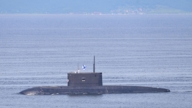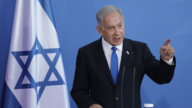【新唐人2013年09月07日讯】叙利亚内战战事踏入第三年,早前的化学武器袭击,更令叙利亚局势急速恶化。最近,美国政府宣布掌握了叙利亚总统阿萨德对国民使用沙林毒气的新证据,并向阿萨德发出军事打击威胁。美国《华尔街日报》刊文认为,这让北京当局陷入了新的困境。
叙利亚当局被指曾经数次对平民使用化学武器,8月21号发生在首都郊外的那起大规模攻击是最新一次。美国说,那起攻击导致1429人死亡,其他国家和组织公布的死亡人数低于美方的统计。
英国首相卡梅伦9月5号接受英国《BBC》采访时表示,英国也获得叙利亚使用化学武器新证据。
对于最新的中东危机,中共还是以惯常的姿态作出反应。9月2号,中共外交部发言人洪磊说,中方注意到关于美方公布证据的报导,但他没有对此做出任何评价。中共喉舌《环球时报》指责美国突然要发动攻击,“轻率得像敲核桃”。《新华社》则说,美国总统欧巴马迷恋武力将令美国误入歧途。
美国《华尔街日报》9月3号的文章说,几十年来,中共宣称的外交政策的基本原则是不干预其他主权国家的内政。文章讽刺道,这一原则在中东导致了一系列外交冲击。
时事评论员司马泰认为,中共经常用所谓的不干涉别人内政作为挡箭牌,所以它的反应不足为奇。
司马泰:“它干涉别国内政,简直没有任何顾忌。它用大量的钱去给一些小国家、独裁国家,包括一些非洲国家,用钱去收买它们,让它们在联合国帮它说话。在西方国家,它进行渗透,对媒体渗透,收买他们的人。”
从利比亚狂人卡扎菲到埃及的穆巴拉克,他们的独裁暴行早已注定他们要垮台。《华尔街日报》的文章分析,中共领导人之所以依然对这些暴君表示支持,因为他们认为,如果西方国家可以为中东那些非民主政府“送行”,那么或许有一天就会试图推翻中共政权。
中国问题专家蓝述:“ 整个共产主义的历史就是反人道的历史,所以中共担任了常任理事国以后,它明明看见了对人道的践踏它也不去管,这个才是问题的本质。因为它是共产主义的独裁国家。”
中国问题专家蓝述分析,中共支持叙利亚政府的原因,主要有两点,一是希望在和美国或其他西方国家打交道时,中东地区如果有一个盟友,中共手上便能多一点筹码;另外,中共也希望借此来讨好俄国。
蓝述:“因为俄国在叙利亚有大量的利益,石油、军售等等。讨好了俄国后,它将来和俄国走的近一点,将来在亚太地区和周边国家发生冲突时,它有可能从俄国那得到支持。”
时事评论员林子旭表示,这几年看到周围的狐朋狗友一个个落马、死掉,中共就已经胆战心惊。
时事评论员林子旭:“阿萨德政权如果再垮台了,中共或许就只能抱着朝鲜哭泣了。叙利亚如果出现政权更替,国内的舆论必然又是一番讨论,这都是中共最不希望看到的”
目前中共在中东没有军事基地,也没有地面部队。与此同时,中共在中东的利益也与日俱增。除了对伊拉克油田和沙特阿拉伯及海湾地区的大型建筑项目进行了大力投资,中国国企也派出成千上万名工程师、地质学家和工人,为那些项目提供支持。
《华尔街日报》文章观察指出,在这一地区选择错误的一边,让中共付出了高昂代价。它不仅令北京与中东地区民粹主义政府之间的关系复杂化,同时也使得中国能源和工程公司的前景受到威胁。
采访/易如 编辑/王子琦 后制/孙宁
Syrian Situation Brings Dilemma for Beijing
While the Syrian civil war enters its third year, the situation
has rapidly deteriorated due to prior chemical weapon attacks.
Recently, the U.S. government announced that new evidence
showed Syrian President Assad using sarin gas to kill civilians.
The Wall Street Journal published an article saying
that this has brought a new dilemma for Beijing.
Syrian authorities have been accused several times of using
chemical weapons against civilians.
On August 21, a large scale attack occurred at the outskirts
of the Syrian capital.
The U.S. said the death toll of this attack was 1,429,
but other countries and organizations showed a lower figure.
On September 5, British Prime Minister David Cameron
said, during an interview on British BBC, that the British
have new evidence of chemical weapons
having been used in Syria.
For the latest Middle East crisis, the Chinese Communist
Party (CCP) responded with its usual attitude.
On September 2, Hong Lei, spokesman of China’s Foreign
Ministry, said China noticed the U.S. evidence report,
but would not make assessment on it.
The CCP’s mouthpiece Global Times accused the U.S.
of attempting to launch a military attack as recklessly
as cracking walnuts.
Xinhua News Agency said that President Barack Obama
is obsessed with using military power, which may lead
the U.S. astray.
The Wall Street Journal article said for decades, the CCP
adopted a principle of non-intervention towards internal
affairs of other states.
However, the article quipped, that principle is leading
to a series of diplomatic impact in the Middle East.
Sima Tai, political commentator, believes that the CCP
often uses non-interference of internal affairs of others
as a shield, so its reaction is expected.
Sima Tai: “China interferes with internal affairs of others,
almost without scruple.
It gave a lot of money to some small countries
and authoritarian regimes, including some African countries,
so these countries speak for China in the United Nations.
Meanwhile, China infiltrates the Western media,
buying their employees."
The report said that from Libya’s Gaddafi to Egypt’s
Mubarak, these autocratic regimes were doomed to collapse.
But, why did the CCP support these dictators?
Because the CCP thinks if the Western countries can see
these non-democratic countries in the Middle East off,
perhaps one day it will attempt to overthrow the CCP.
Lan Shu, China affairs expert: “History of communism
is history of anti-humanity.
Therefore, after becoming a permanent member of the UN’s
Security Council, China ignores humanitarian abuses.
That is the nature of the problem because it is a communist
dictatorship."
Lan Shu believes that the CCP supports the Syrian regime
for two reasons.
It is good to have an ally in the Middle East when dealing
with the U.S. or other Western countries.
It also hopes to please Russia.
Lan Shu: “Russia is interested in Syrian oil and selling
arms to Syria.
Pleasing Russia or getting close to Russia may gain support
from Russia in the future if there are conflicts
in the Asia Pacific region and the neighboring countries."
Political commentator Lin Zixu: “In recent years, the CCP
was scared to death, watching his buddies fall one by one.
If the Assad regime collapses, the CCP can only cry
with North Korea in its arms.
However, the CCP would hate to see another regime
replace the current one in Syria."
At the moment, the CCP has neither military bases nor
ground troops in the Middle East, but increased interests.
In addition to investing heavily in the oil fields in Iraq,
Saudi-Arabia, and major construction projects in the Gulf,
the CCP also sent tens of thousands of engineers, geologists
and workers to provide support for those projects.
The Wall Street Journal article pointed out that the CCP
has to pay dearly for choosing the wrong side in that area.
Not only does it complicate the relationship between Beijing
and the Middle East, but it also threatens the future of China’s
energy and engineering companies.





























